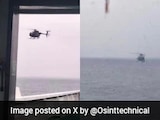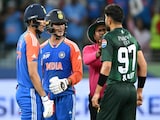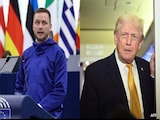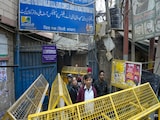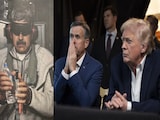That the world is getting even more polarized with each passing day was underscored by two visits this week - Chinese President Xi Jinping's trip to Russia and Japanese Prime Minister Fumio Kishida's to Ukraine. While Kishida's visit was all about showing solidarity with the Ukrainians, the Chinese President ostensibly had a more grandiose aim of trying to broker peace between Russia and Ukraine, though in reality, it was primarily aimed at cementing the Sino-Russian axis.
Major power polarization is today the wider structural reality that is shaping the contours of the emerging global order, and it is a warning sign for all nations, including India, of what is likely to come.
Fresh off the success of brokering a Saudi Arab-Iran rapprochement in the Middle East, Beijing feels that it can use that momentum to further its global leadership credentials in Eurasia as well. But where the Middle Eastern politics was filling the void left by the US, and the Riyadh-Tehran deal narrowly focused on restarting the diplomatic ties severed in 2016, the Russia-Ukraine conflict is not yet ripe for a peace deal.
Though Putin has suggested that "many provisions of the Chinese peace plan can be taken as the basis for settling the conflict in Ukraine, whenever the West and Kyiv are ready for it," any peace negotiations will be decided by battlefield realities. And for now, neither of the two feels they have any incentive to come to the negotiating table.
For China, peace in Ukraine is hardly a priority, despite the 12-point "peace plan" it published last month, which Xi Jinping alluded to during his meeting with Putin. Talking in generalities, Xi merely underlined that China is "always for peace and dialogue" and is "constantly guided by the UN charter, adhering to an unbiased position." What this means for a Russia-Ukraine reconciliation was hardly clear, but perhaps that was the whole point.
This visit by Xi - his first foreign foray after taking over as the Chinese President for an unprecedented third term - was more about underscoring the tightening bond between the world's two most powerful dictatorships. Referring to the two as "strategic partners" and "great neighbouring powers," Xi made it clear that "Chinese and Russian ties have gone far beyond bilateral communications".
Xi and Putin put in a great deal of effort in emphasising the economic underpinnings of their relationship, with suggestions for developing ties in finance, transport and logistics and energy. Xi suggested focusing, in particular, on energy, raw material and electronics. With both Russia and China facing isolation from the West, engaging each other on economic issues can allow them, to a certain extent, to fill that void.
Behind the façade of trade and economics, it's the evolving global balance of power that is shaping the trajectory of their ties. There are growing concerns in the West that Sino-Russian defence ties are growing. NATO Secretary-General Jens Stoltenberg became the latest global leader this week to warn China against providing lethal aid to Russia. He suggested that "We haven't seen any proof" of China delivering lethal weapons but there are some signs of it being "a request from Russia."
Russia is now firmly embedded as a junior partner in a relationship that till a few years back was seen as one lacking strategic oomph. Today, partly due to western policies and partly due to Putin and Xi defining their foreign policy agendas in starkly anti-western terms, a Sino-Russian alliance is beginning to look like a serious axis that has the potential to reshape the post-Cold War geopolitics. But it is Russia, starkly isolated and economically vulnerable, that needs Chinese support to sustain its geopolitical ambitions. And China has so far been reluctant to move beyond rhetoric when it comes to Russian aggression against Ukraine. For Beijing, Moscow is useful as far as challenging US hegemony is concerned, but Chinese economic stakes in the western world are much too large to get militarily involved in a war in which its stakes are almost non-existent.
So, while the world saw Putin laying out the red carpet for his dear friend Xi, the Chinese leader merely hinted at potential military support. Though Xi recognizes the need for Putin in China's escalating confrontation with the US, especially in the Indo-Pacific theater, substantive strategic cooperation with Russia will only generate more negative headwinds in Beijing's ties with Europe. It's a careful balancing act where Xi is hoping Putin's support can allow China to manage the evolving balance of power in its favour.
All this balance of power politics is couched in the language of global governance, with Xi trying to paint the US as the villain and China as the savior intent on resolving a knotty geopolitical problem. Chinese Foreign Minister Qin Gang spoke to his Ukrainian counterpart before Xi's visit to Russia and it is expected that the Chinese President will have a phone conversation with Ukrainian President Volodymyr Zelensky after his Moscow visit.
But this diplomatic choreography is neither going to resolve the Ukraine war nor is it intended for that purpose. Xi Jinping is primarily focused on achieving a favourable balance of power in the Indo-Pacific, and Putin, as a junior partner willing to keep the West distracted, is a partner of convenience. This Sino-Russia axis is likely to have a fundamentally transformative effect on India's security calculus. The Indian strategic community has so far shied away from engaging in a substantive debate on this, happy to revel in tired old clichés. That needs to change fast if New Delhi is to exploit the emerging global balance of power fully to its advantage.
Harsh V. Pant is a Professor of International Relations at King's College London. He is Vice President - Studies and Foreign Policy at Observer Research Foundation, New Delhi. He is also Director (Honorary) of Delhi School of Transnational Affairs at Delhi University.
Disclaimer: These are the personal opinions of the author.
